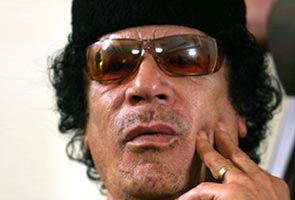Washington: The United States closed its embassy in Tripoli on Friday and imposed unilateral sanctions against Libya, including the freezing of billions in government assets, as the Obama administration made its most aggressive move against Col. Muammar el-Gaddafi since his security forces opened fire on protesters.
Just minutes after a charter flight left Tripoli carrying the last Americans who wanted to leave Libya, officials markedly toughened the administration's words and actions against Colonel Gaddafi, announcing that high-ranking Libyan officials who supported or participated in his violent crackdown would also see their assets frozen and might, along with Colonel Gaddafi, be subject to war crimes prosecution.
"It's clear that Colonel Gaddafi has lost the confidence of his people," said the White House press secretary, Jay Carney, in a briefing that was delayed to allow the plane to take off because the Americans feared that the Libyan leader might harm the passengers. "His legitimacy has been reduced to zero."
On Friday night, President Obama issued a formal executive order freezing the American-held assets of Colonel Gaddafi, his children and family, and senior members of the Libyan government.
With Colonel Gaddafi killing more of his people every day in a desperate bid to remain in power, it was not clear that these actions would do much to mitigate the worsening crisis. Sanctions, for instance, take time to put in place, and every other option comes with its own set of complications. Colonel Gaddafi, increasingly erratic, has seemed to shrug off outside pressure, becoming even more bizarre -- with charges that protesters are on drugs -- in the face of the world's scorn. And unlike with Egypt and Bahrain, close American allies that also erupted into crisis, the United States has few contacts deep inside the Libyan government, and little personal sway with its leadership.
Libya and the United States resumed full diplomatic relations only in 2008; before that it was regarded as an outlaw state. In fact, even as he was announcing that the Obama administration was cutting off military to military cooperation with the Libyan Army, Mr. Carney noted that such cooperation was "limited" -- a stark contrast to the deep ties that the Pentagon has cultivated with other Arab armies.
The tougher American response came nine days into the Libyan crisis and six days after Colonel Gaddafi's security forces first opened fire on protesters at a funeral in Benghazi, plunging Libya into something close to civil war and igniting worldwide condemnation. In the days after, the Obama administration repeatedly called for an end to the violence, but avoided criticizing Colonel Gaddafi by name -- a cautious policy that brought criticism from the president's Republican rivals.
Countering those criticisms, administration officials said they feared a hostage crisis, which tied President Obama's hands until American citizens, diplomats and their families were evacuated from Libya. A ferry with 167 Americans left Tripoli on Friday afternoon, having been delayed for two days by 15- to 18-foot waves in the Mediterranean, and a charter plane with additional Americans left Friday night. The embassy, Mr. Carney said, "has been shuttered."
European leaders have been more aggressive. President Nicolas Sarkozy of France has called on Colonel Gaddafi to resign, a step that Mr. Obama has yet to take. But American allies and the United Nations also moved to isolate Libya diplomatically. A senior United Nations official said that the world should intervene to stop the bloodshed in Libya, and France and Britain called on the international organization to approve an arms embargo and sanctions. NATO said it was ready to help evacuate refugees.
In Geneva, the normally passive United Nations Human Rights Council voted unanimously on Friday to suspend Libya's membership, but not before a junior delegate of the Libyan mission announced that he and his colleagues had resigned after deciding to side with the Libyan people. The gesture drew a standing ovation and a handshake from the United States ambassador, Eileen Donahoe.
Administration officials said that getting the people around Colonel Gaddafi to abandon him is a key part of the American and international strategy to isolate him. Administration officials say they are supporting a British proposal to try to bring before a war crimes tribunal Colonel Gaddafi and those who support or enable his violent crackdown.
"It's hard to do, but the point is to encourage the remaining supporters of Gaddafi to peel off," said Robert Malley, the Middle East and North Africa program director at the International Crisis Group. "If you want to accelerate his demise, you send the message that those who do not participate in the violence might not be prosecuted for their association with the regime."
American officials are also discussing a no-flight zone over Libya to prevent Colonel Gaddafi from using military aircraft against demonstrators. But such a move would have to be coordinated with NATO, and would require a Security Council resolution, diplomats said. Arab governments might object on sovereignty grounds.
Administration officials have avoided public discussion of additional military options. When asked whether the United States was considering using its military assets in the region -- including a marine amphibious ship in the Red Sea -- to support the rebellion in Libya, Mr. Carney said, "We are not taking any options off the table in the future." But administration officials said there were no immediate plans to intervene militarily.
The administration's measures appeared to satisfy human-rights groups. Analysts said they wanted more details about the sanctions, but they were encouraged by signs that the United States would support the effort to have Colonel Gaddafi referred to the International Criminal Court on war-crimes charges, as well as by a special NATO meeting.
"Even if people aren't explicitly talking about no-fly zones, the fact that NATO met today suggests there is more on people's minds than diplomacy," said Tom Malinowski, the director of the Washington office of Human Rights Watch. "I sense military contingencies are on the table."
One complication that could speed up consideration of any military action would be evidence that Colonel Gaddafi was prepared to use his remaining stockpile of mustard gas.
The American sanctions will also include travel bans against Colonel Gaddafi and senior members of his government, and the freezing of assets, including a move to freeze all American-controlled portions of Libya's sovereign wealth fund, administration officials said. Sanctions, once they go into effect, could have an impact on oil-rich Libya. According to an American diplomatic cable obtained by WikiLeaks, a senior Libyan official told American diplomats in January 2010 that the Libyan Investment Authority, which manages the country's oil revenue, had $32 billion in cash, and that several American banks managed up to $500 million in each of those funds. Administration officials said they planned to go after that money as part of the punitive sanctions.
"The government of Libya has claimed that it holds as much as $130 billion in reserves and its sovereign wealth fund reportedly holds more than $70 billion in foreign assets," an Obama administration official said. The official said that "while we are aware of certain assets owned by the Libyan government in the U.S., there are likely additional funds that we are not aware of."
Analysts said that going after the assets of Colonel Gaddafi's aides would probably be more effective than going after those held by the leader himself, given that he is engaged in an all-or-nothing defence of his rule.
A more draconian approach, suggested Danielle Pletka, an expert on sanctions at the American Enterprise Institute, would be to impose a trade embargo on Libya, excepting only food and other humanitarian aid.
The United Nations Security Council will discuss a proposal backed by France and Britain for multilateral sanctions, including an arms embargo and financial sanctions. But no definitive move was expected until next week. Italy, which is not in the Security Council and has deep investments in Libya, said Friday that it also backed sanctions.




 International Cricket C
International Cricket C